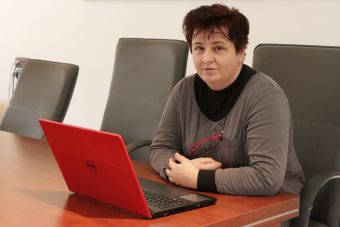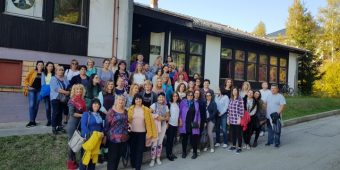“Circular economy as a part of the concept of society’s sustainable development” is the project of the professional organisation Ambassadors of sustainable development and environment. The goal of this organisation is to inform the general public about the values of circular economy concept, along with the portrayal of prior experiences and good practise examples about how this concept has already been implemented in education centres in Serbia. As a result of this project, the review was provided about the situation in Serbia, and farther (through previous experiences in EU and worldwide, in terms of Sustainable development goals), also about the progress of circular economy concept, our position at the moment and possible direction of further development and options for participation. The project was supported by the Ministry of environmental protection through co-financing model for projects of a nongovernmental organisation.

Aleksandra Mladenovic, the chairman of the organisation and national coordinator of the International programme Eco-schools, says that in the course of the programme, from July till November 2019, and having in mind the fact that Serbia has only scratched the surface of circular economy, it was necessary to examine the possibilities and legal frame, find the best practice examples and make the public familiar with them, allowing for follow-up on further development.
The concept of circular economy encompasses industrial production, which is based upon renewability of the materials, renewable energy sources implementation, reduction and/or elimination of chemicals usage, minimising waste generation, product design which will allow longer life cycle etc. The value-added product stands on “staying” longer in use and not making waste.
The transition to a circular economy requires changes in the entire life cycle of a product and product design. Thus, new business and trade model is needed, as much as an improved way of turning waste into resources and different consumers’ attitude, etc. Furthermore, it is necessary to change and innovate the system: in technology, organisations, society, financing procedures and policies, which are only a few of the starting points required for the transition process from linear to a circular economy.
In focus:
During the implementation of the project “Circular economy as a part of the concept of society’s sustainable development”, the major stakeholders were determined, whose role in the development of the circular economy concept in Serbia is conspicuous, particularly about to entrepreneurial initiatives of the education centres, women and youth. Also, the consultations were organized with the prominent representatives from the sectors of industry, science, state and local governments and non-governmental organisations, who already have experience in the implementation of the circular economy concept in Serbia. At the same time, the general public had a chance to get familiar with the accomplishments in the circular economy, through the publication designed for the school kids and public appearances of teachers and local governments’ representatives.
“Two years ago, when we first mentioned to the Ecoschool coordinators that what they do within their institutions, through the course of lectures, but especially through afterschool activities, has great importance and that they might help development and ’testing’ of circular economyin practice, they were surprised and slightly confounded. In the beginning, they weren’t sure what term ’circular in economy’ generally means and how they could implement basic ideas about that same ’circular economy’ into their regular curriculum”, Aleksandra explained how the first encounter of the project participants with a new concept had gone through.
However, it wasn’t much of an obstacle to the members of the “Ambassador of sustainable development and environment” team. They started with a series of lectures and numerous practical activities, which at last concluded with an expert conference “Principles of circular economy in the environmental protection” that is accredited by the Ministry of education, science and technological development. The conference was held in October 2019, in partnership with local communities of Cajetina, their tourist organisation, Eco-schools “Dimitrije Tucovic” from Cajetina and “Milivoje Borovic” from Mackat. Aleksandra says that they are particularly pleased as they managed to introduce thecircular economy, at least for the time being, as a way of thinking and guidelines for future activities, into the Ecoschools and local communities.

“In those communities, people have already changed their attitudes, and they look at materials, products, waste, production process etc. in a different way. They spread further the idea of the circular economy. This way new approach to resources and items has come out of the Ecoschools and entered the homes, institutions and around the local communities”, proudly points out Aleksandra.
The document “Circular economy in Serbia: the process started (2019)” shows precisely where the development of the circular economy concept stands at the moment, which encompasses advantages, obstacles, downsides, possible solutions for overcoming problems etc. The document alone has importance as a unique review on progress and further ways of staying involved in.
“Besides this ’serious’ document, we made a booklet for children and youngsters, with imaginative illustration and original texts. We distributed the booklets throughout the Eco-schools in Serbia so that youngsters can learn and apply basic values of this concept since the circular economy is explained in pictorial and appropriate to their age manner”, Aleksandra said. All publication will be available on the website of the “Ambassadors of sustainable development and environment https://ambassadors-evn. com/
The team of the organisation “Ambassadors of sustainable development” keeps track of the progress of circular economy and climate changes not only in Serbia but in the region too, as the partners on the regional project, financed by European Union, named “ENV.net factoring the environmental portfolio for the Western Balkans and Turkey in the EU Policy Agenda” (ref.no. 2017/394-372). Meanwhile, they expect that Eco-schools, as a never-ceasing source of good examples and substantial activities, will approach with suggestion and ideas about how to reuse an old textile, recycle secondary raw materials or extend the life cycle of objects and appliances. We are surely going to report on that in the future too!
Prepared by: Tamara Zjacic
This article was published in the new issue of the Energy portal Magazine GRINNOVATIONS, December 2019 – February 2020.



